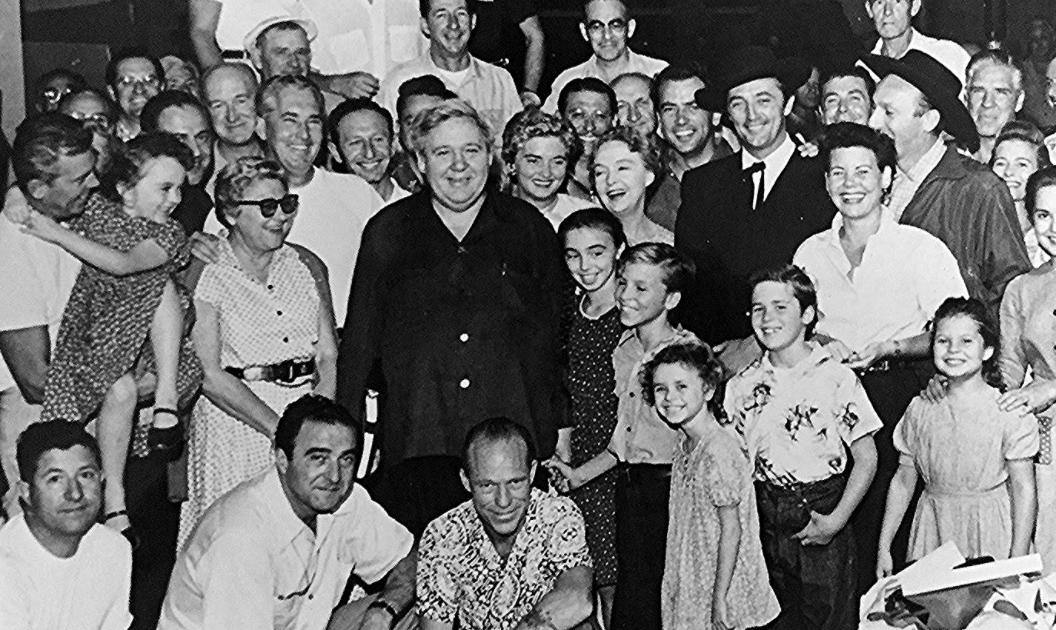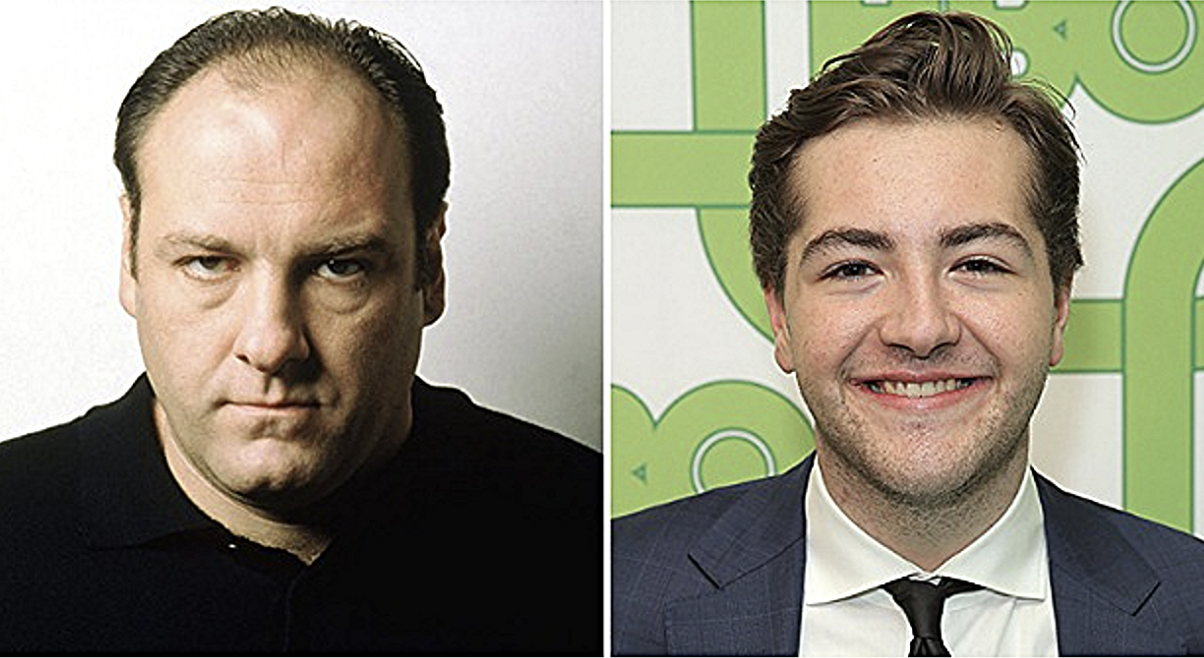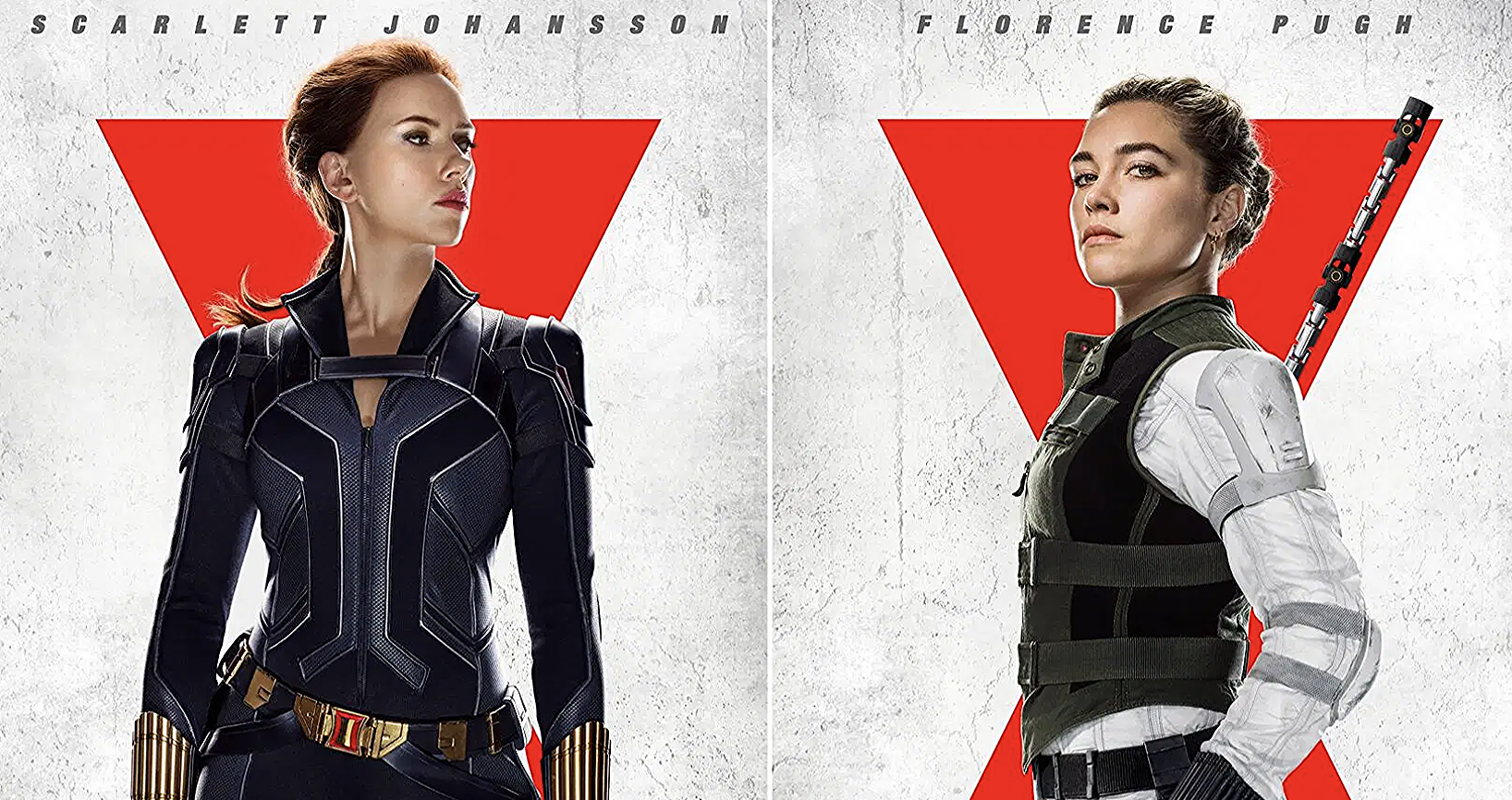Yet another metaphorical female rage film…deadpan humor, platinum blonde hair, nobody gives a shit, “howz that goin’ for you?” Apparently playing upon Kate Beckinsale‘s real-life rep as a man-eater…well, a young-man eater. Directed by Tanya Wexler, the niece of Haskell Wexler.
Daily
Scourge of White Socks
Yesterday I found this photo of the cast and crew of The Night of the Hunter. Principal photography began on 8.15.54 and ended on 10.7.54 — 36 days total. The photo was probably taken on the final day. (Where was Shelley Winters?) I had two reactions. One, I loved the tickled smiles worn by director Charles Laughton and lead actor Robert Mitchum. And two, I was taken aback by the white socks worn by the two kneeling crew guys. In an April 2020 piece called “Sound-Stage Fashion,” I noted the dress code of the average below-the-line Hollywood sound-stage grunt in the mid ’50s. The outfit consisted of (a) a checked short-sleeve sports shirt or long-sleeve business shirt, (b) a pair of baggy, pleated, hand-me-down business pants, and (c) brown or black lace-up shoes with white socks.
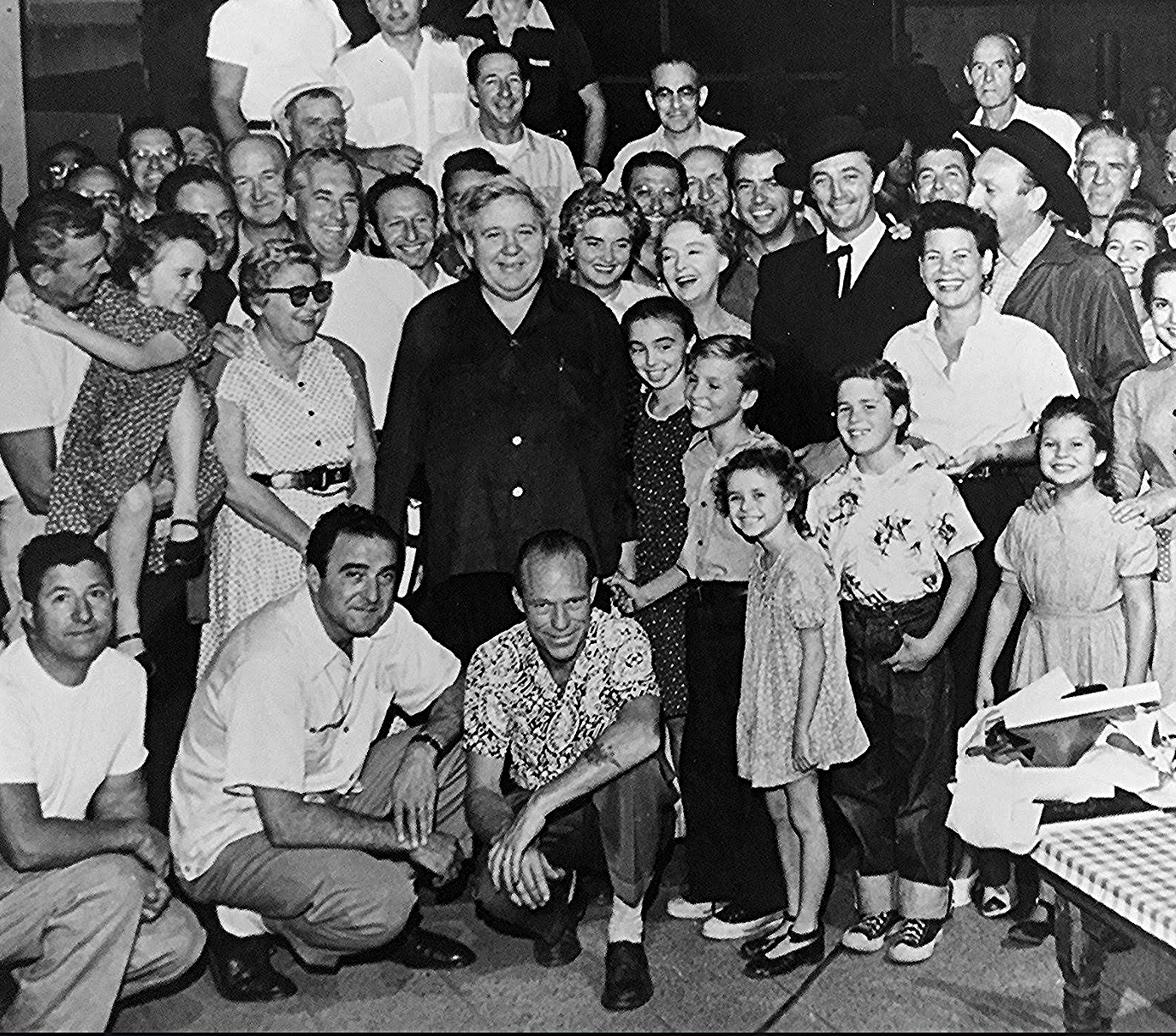
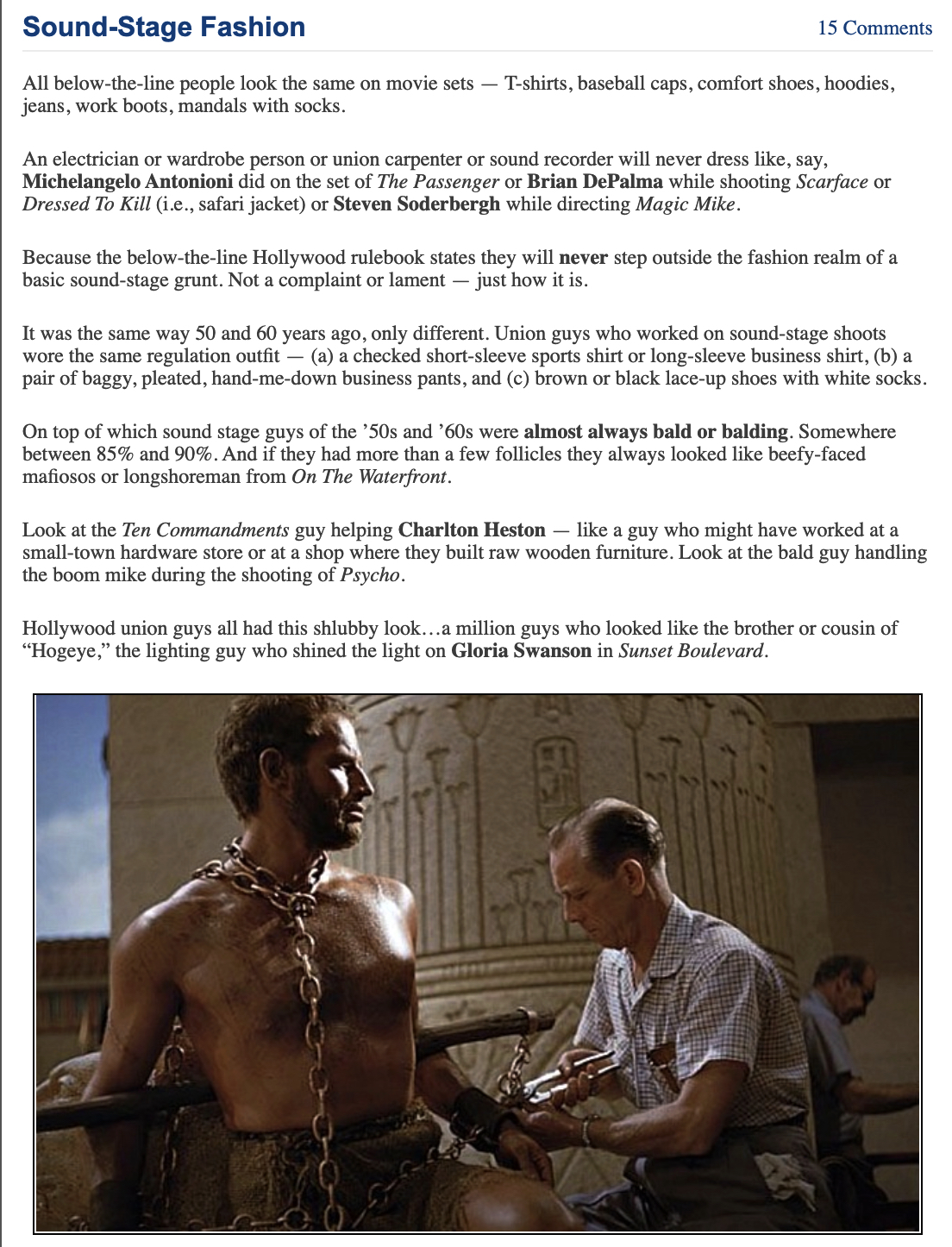
To Wake Up With A Film
I’ll wager that 99% of those who consider themselves serious moviegoers have never seen a film before noon, much less in the early morning. I’m also presuming that at least 85% to 90% of theatrical viewings happen in the early to mid evening, with the remainder covered by daytime showings for seniors and midnight shows for cultists.
I’m telling you straight and true that you haven’t lived until you’ve caught a theatrical screening at breakfast hour or before.
I’ve seen at least a hundred films at 8:30 am over the last 25 years, and almost all of them at the Cannes Film Festival. Press screenings simply begin at that hour.
I’ve been writing for years about the special current or communion that kicks in when you catch a film in the early morning, especially when the film turns out to be extra good and double especially when you’ve consumed a large cappuccino just before it starts.
There’s something high-voltage about catching a breakfast-hour screening. You somehow feel more attuned and observant, and your aesthetic pores are more wide open than later in the day or that evening.
Anyone who’s caught a midnight film after waking 16 or 17 hours earlier knows what that’s like. Your system struggles to focus upon the film as much as possible and it feels fine initially, but after a 45 minutes or an hour you can feel yourself fading. You might stay awake but your concentration is less than it could or should be.
During the 2019 Cannes Film Festival Jordan Ruimy and I caught Robert Eggers‘ The Lighthouse at 8:30 am, but circumstances were such that we had to be at the theatre (the two-story facility below the J.W. Marriott theatre) at 7:30 am, which meant arising an hour earlier. One Red Bull + two strong coffees = throttle up!
I’ve mentioned before that my first viewing of George Lucas‘s THX-1138 happened around 4 or 4:30 am. It was being shown as part of a 24-hour FILMEX sci-fi marathon, which happened (as I recall) in the spring of ’74 or ’75. I remember getting up at 3 or 3:15 am and driving over to the Century City Plitt theatres in the dark.
If an 8:30 am screening feels highly charged, it’s even more pulverizing to catch a film at 4:30 am. Your system hasn’t even begun to think about waking up, and all you’ve got going is that first jolt of caffeine.
Somehow or some way, every film fanatic needs to catch a film at dawn. Just to do it, just to feel it.
Dreams of Angie Dickinson
I’ve been trying to find the name of the gravel-voiced, gray-haired actor playing the FBI guy in this jailhouse conference scene with Junior Soprano (Dominic Chianese). Or the episode in which this conversation happens. No luck so far.
“Junior” and Chianese were born close together — Chianese in 1931, “Junior” in ’29 or thereabouts. Corey Stoll, 45, will play the 40ish Junior in The Many Saints of Newark. Chianese’s best known role before he lucked into his long-running Sopranos role was “Johnny Ola”in The Godfather, Part II, whom Chianese portrayed when he was 42.
Re-Selecting 1959 Oscar Winners
It’s time to rectify the 1959 Oscars once and for all. Better late than never. The winners of record will still retain their places in history, of course, but 61 years have passed, new perspectives have emerged, and it’s time to ratify the new deal. But without being too rigid-minded.
Charlton Heston gave a first-rate performance in Ben-Hur, and rode that film’s political coattails to win a Best Actor Oscar. But who watches that 1959 Biblical epic today to savor Heston’s emoting? The film is admired, justly, for the sea battle and chariot race sequences, for Robert Surtees‘ cinematography, and for the huge expensive sets. But HE has another Best Actor winner in mind.
Starting from the top…
BEST MOTION PICTURE: Alfred Hitchcock‘s North by Northwest. 1st Runner Up: Billy Wilder‘s Some Like It Hot. 2nd Runner Up: John Ford‘s The Horse Soldiers. 3rd Runner Up: Lewis Milestone‘s Pork Chop Hill. 4th Runner Up: Otto Preminger‘s Anatomy of a Murder.
BEST DIRECTOR (ditto): Alfred Hitchcock, North by Northwest.
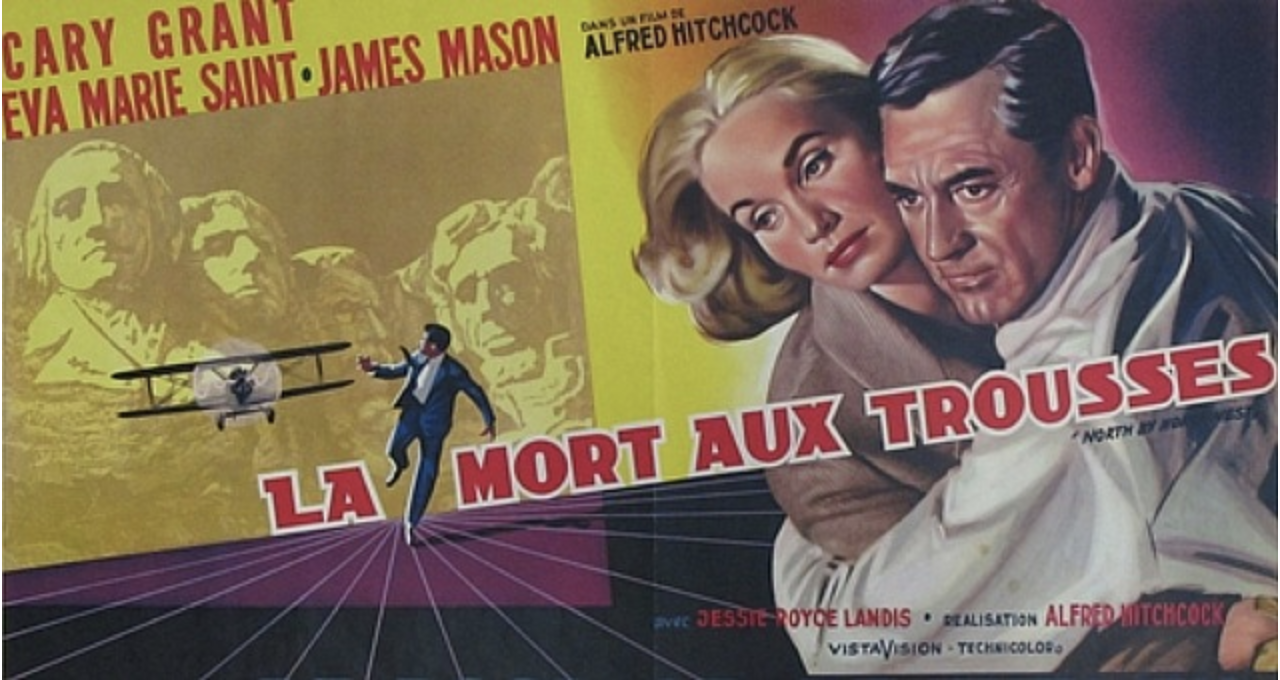
BEST ACTOR: Tie between Cary Grant, North by Northwest, and Jack Lemmon, Some Like It Hot. Other nominees: James Stewart, Anatomy of a Murder; Gregory Peck, Pork Chop Hill; Laurence Harvey, Room at the Top.
BEST ACTRESS: Marilyn Monroe, Some Like It Hot. Runners-Up: Simone Signoret, Room at the Top; Anna Magnani, The Fugitive Kind; Audrey Hepburn, The Nun’s Story; Claire Bloom, Look Back in Anger.
BEST SUPPORTING ACTOR: Tie between Joe E. Brown, Some Like It Hot and Fred Astaire, On The Beach. Runners-up: Dean Martin, Rio Bravo; Rip Torn, Pork Chop Hill; George C. Scott, Anatomy of a Murder; Hugh Griffith, Ben-Hur.
BEST SUPPORTING ACTRESS: Joanne Wpodward, The Fugitive Kind. Runners-Up: Maureen O’Hara, Our Man in Havana; Shelley Winters, The Diary of Anne Frank; Juanita Moore, Imitation of Life; Ava Gardner, On The Beach.
BEST FOREIGN LANGUAGE FILM: The 400 Blows, d: Francois Truffaut. Runner-Up: Pickpocket, d: Robert Bresson.
Where’s “Cry Macho” Trailer?
Clint Eastwood‘s Cry Macho, based on a long-percolating script by the late Richard Nash (the novel version dates back to ’75) and co-written by the still-kicking Nick Schenk, was originally slated to open on 10.22.21. Then it was shuffled around and will now open on 9.17.21 with a simultaneous HBO Max release — Clint’s first streamer.
That’s two weeks before The Many Saints of Newark opens on 10.1, and the trailer for that just dropped. So where’s the Cry Macho trailer?
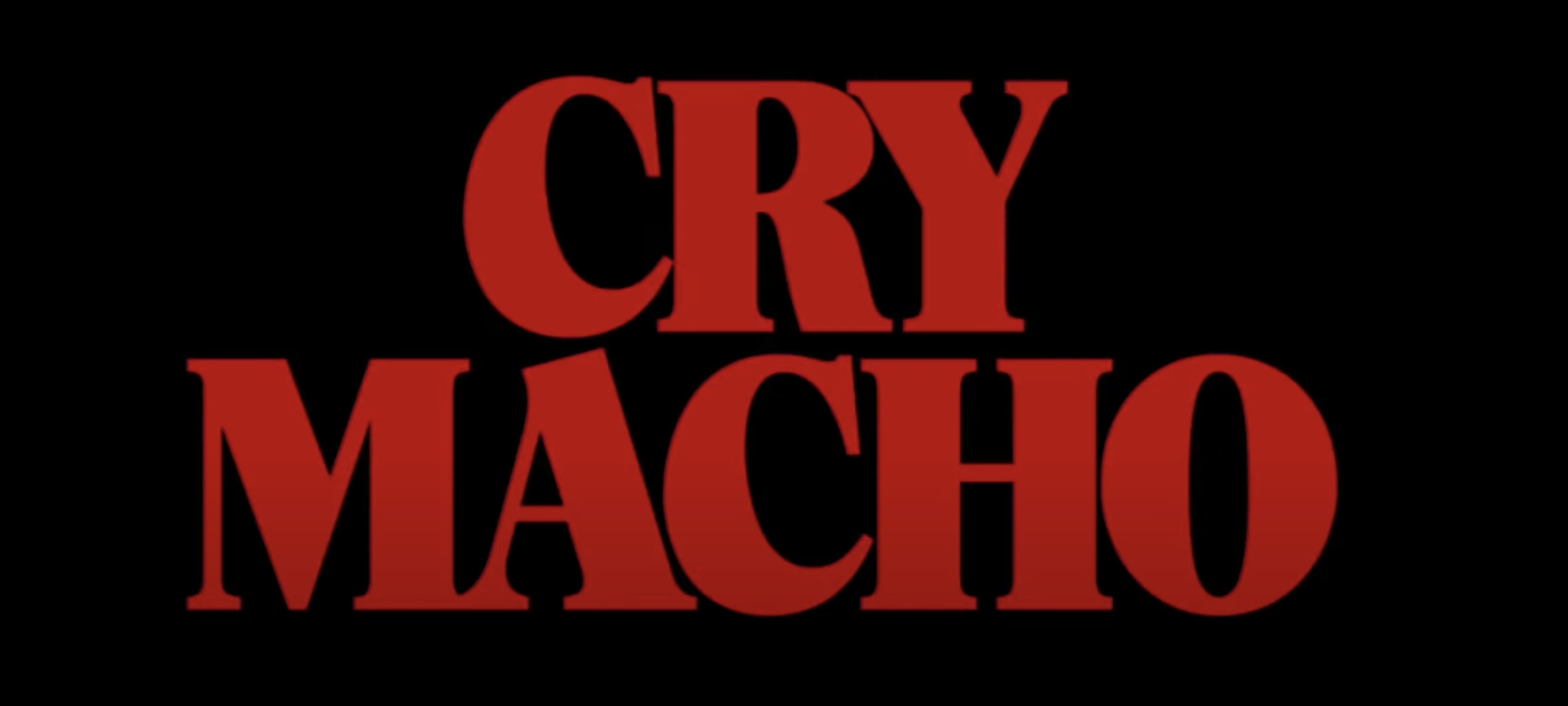
Cry Macho is essentially an older guy-younger guy relationship story…a piece about values, regrets, admissions, looking forward, wild roads. There’s an extensive synopsis for Nash’s 1975 novel on the Wiki page. Eastwood’s character, called “Miko” in the film, is a crusty old cuss; in Nash’s book he was a 38 year-old rodeo rider named Michael “Mike” Milo. Over the years various big-name actors including Roy Scheider, Burt Lancaster, Pierce Brosnan and Arnold Schwarzenegger, were seriously interested in playing Miko/Mike.
Eastwood almost committed to starring in a film version in ’88, but he bailed in order to do The Dead Pool, a Dirty Harry film.
Here’s a shorter Amazon synopsis:
“Mike’s best years are behind him. There was a time when he was the best rider in the circuit, but a divorce and years of hard living have worn his body down. After an accident, his career comes to an abrupt end, but his boss gives him one last job: he must cross the border into Mexico, kidnap his boss’s son, Rafo, from his boss’s ex-wife, to be used as leverage in their ongoing divorce.
“Mike arrives to find the boy has already run away, and his plan is immediately exposed to the local police. When he finds Rafo living on the streets of Mexico city, supporting himself though petty crime and winnings from the occasional cockfight, Mike convinces the boy to come back to Texas. Still running from the law, the two set out on a journey northward that forges an unlikely friendship and forces both to reckon with the choices they’ve made in pursuit of being ‘macho.”
This is Schenk’s third collaboration with Eastwood after Gran Torino (’08) and The Mule (’18).
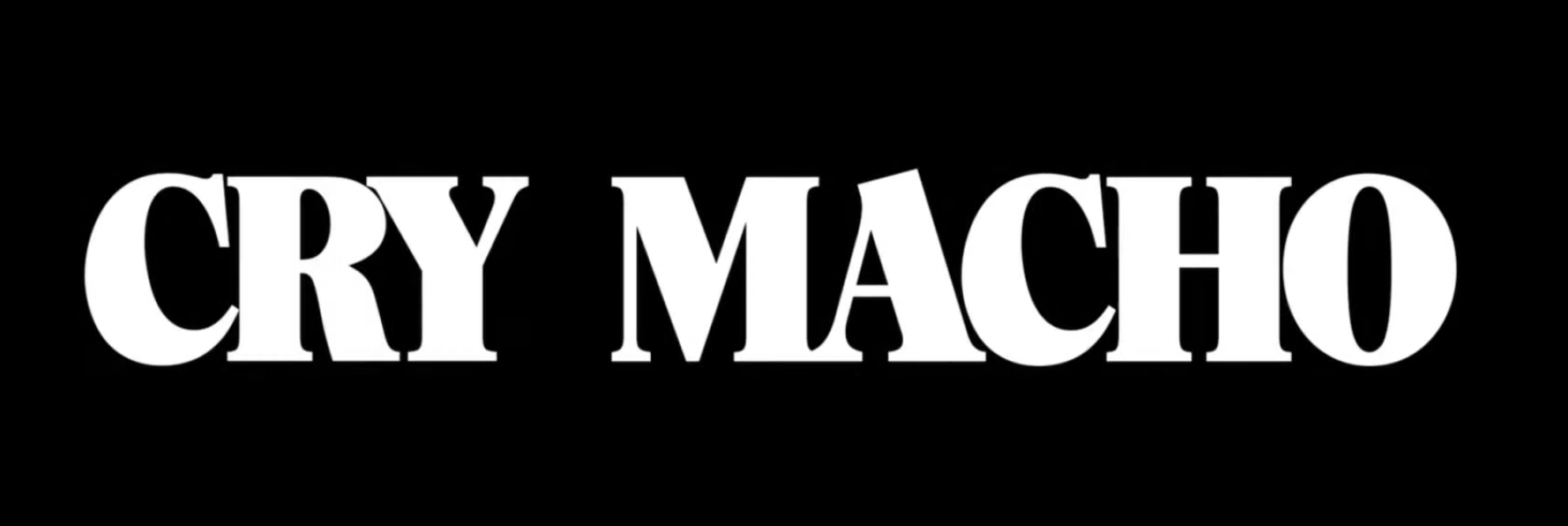
Sold
And if there’s a God, The Many Saints of Newark (Warner Bros./HBO Max, 10.1) will play at Telluride. You can tell it has character, texture…you can tell it’s an actual film made by and for people who are invested in Tri-State area mythology. And you can sense that ardent fans of this film will be…how to put this?…somewhat less enamored of Black Widow.
I can relate, by the way. I grew up (painfully) in New Jersey, and I didn’t apply myself in high school either.
Posted on 12.19.19:


“Black Widow” Assurance
Black Widow (Disney, 7.9) has been screened for the usual salivating suspects, including your MCU fanboys and fangirls. I’ll bet $10K that their reactions are, for the most part, completely without meaning or resonance or trust. At 134 minutes it’s almost certainly going to be a form of punishment for anyone who isn’t a Marvel cultist, especially given that it’s half an origin story — a form of imprisonment in itself. A significant (large?) percentage of critics will default with positive reviews due to the gender representation factor (Scarlet Johansson, Florence Pugh, Cate Shortland directing). But you know what’s coming. Almost certainly a burn, completely negligible, etc. I’m not looking forward to sitting through two hours and 14 minutes of this — what reasonable person of taste would be? Plus Natasha Romanoff has left this mortal coil. Yes, of course — death is an utterly meaningless concept within the MCU, but I saw Endgame…


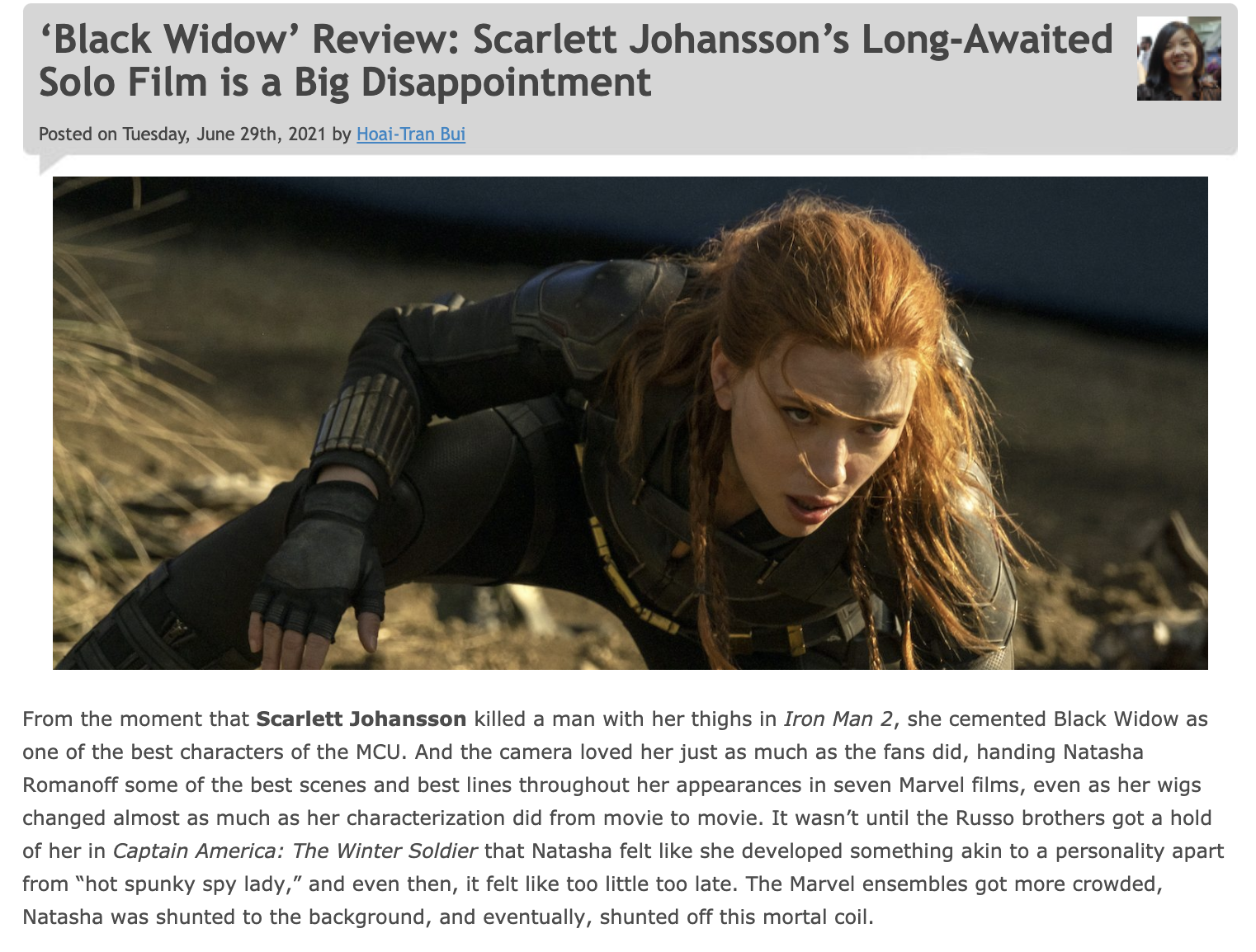

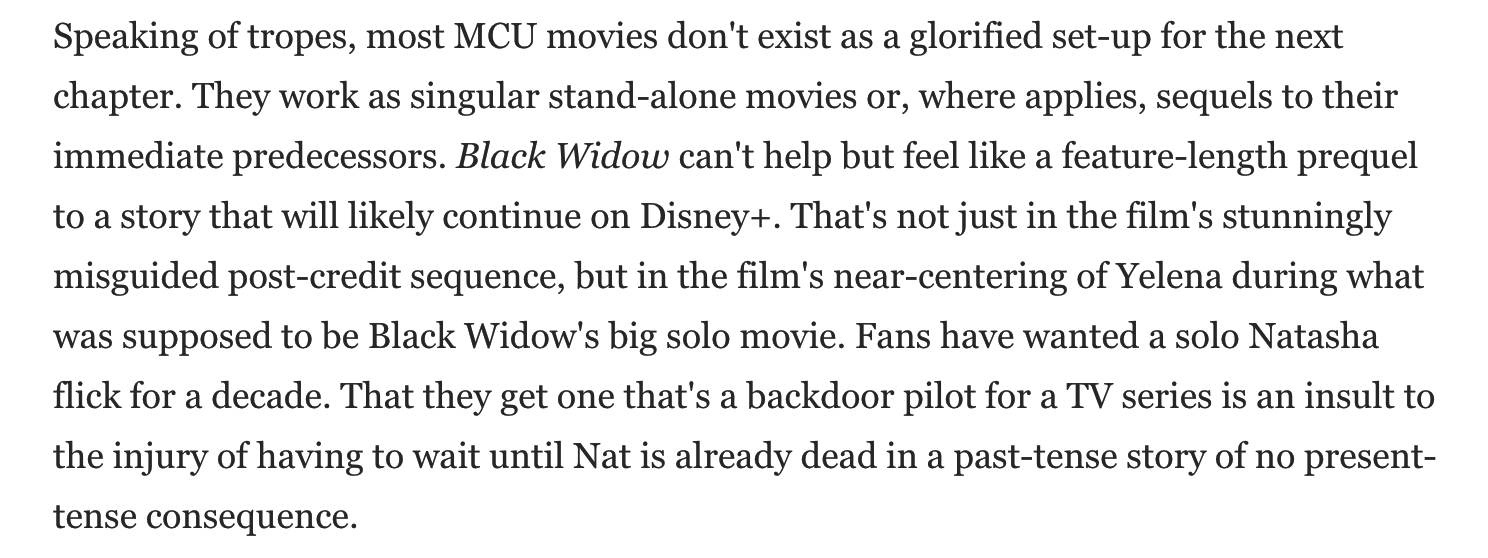
What Is Happiness?
What makes us feel happy or at least comfortable or semi-content about things? Apart from discovering satori or enlightenment, I mean. (I happened to find this realm at age 19 by way of LSD and the Bhagavad Gita, but most many people haven’t a clue about this.) So what makes us feel reasonably good and assured about things?
In five words, a belief in the future. And, if you want to add nine more, the likelihood of a fair amount of sunny days.
Not a belief that a safe and semi-bountiful tomorrow is guaranteed (for that is promised to no one) but knowledge that I’ll have a reasonably fair shot at making good and necessary things happen…an ability to feed the fire and keep the wheels turning and in so doing sample the modest comforts of life (Italian shoes, scrambled eggs and a buttered English muffin, Criterion Blurays, an occasional trip to Rome or Hanoi or Key West) being more or less within reach.
What is the antithesis of this feeling? Well, one way of defining that would be the way I feel now. I love the idea of a flashing present and a robust future, but I don’t believe in it. I believe in my ability to keep working no matter what, as I never get sick and have always felt like I’m 37 (even when I was 21). I trust in my good genes and my general resistance to the usual maladies, and I love my wife, my sons, our two cats, the rumblehog and the endless trove of cinematic delights contained in my 65″ Sony HDR, and of course I cherish my large community of friends and colleagues.
But almost everything that Hollywood Elsewhere depends upon seems to be resting on thin ice these days. I don’t want to sound overly dour, but it all seems to be about a month-to-month luck of the draw and the direction of the sea breezes, which can be moody and temperamental. Fate is so whimsical. Very little feels steady and solid.
A Film That Fit Right In
Ned Beatty‘s recent passing took a lot of us back to John Boorman‘s Deliverance (’72). Released 49 years ago, it was perfect for its time, but would probably not be right for ours. Sometimes it’s better to leave well enough alone.
It’s too white, for one thing. And I’m not sure audiences would want to see an action thriller triggered by the anal rape of an overweight suburban salesman by some unwashed toothless hillbilly — that’s some rough stuff. But what a primal, fascinating tale.
Deliverance was the first and possibly the last well-made drama that scared viewers half to death with the idea that city and suburban folk should stay the hell out of the primitive areas of this country and far away from the residents of these cultures. A film that said “you don’t want to know those people, and they don’t want to know you.”
The basic attraction of Deliverance is the thrill, danger and horror of four suburban guys on a nourishing canoe trip down a beautiful wild river, and how, for a while, it all seems like the greatest woodsy adventure ever.
Until everything turns around in the darkest way imaginable…sexual assault, bloody murder, hiding a body, another killing, a subsequent life or death struggle to survive by having to kill again and and then, back in civilization, having to lie their way out of a possible arrest and prosecution in the aftermath. And all it happening in the midst of a bucolic hillbilly hell — leafy, primal, horrific.
Did Deliverance paint an incorrect and malicious portrait of deep-rural types? Yes, and them’s the breaks. But there’s never been another horror film quite like it. And despite the restrained realistic vibe and first-rate dialogue and Vilmos Zsigmond‘s magnificent cinematography, that’s exactly what it is — a southern nightmare trip.
I wonder how familiar under-40 audiences are with Deliverance, and whether a remake could work. Would there be complaints from the LGBTQ community that a depiction of male rape might somehow demonize homosexuality? (I’ve always wondered if the male rape scene in Pulp Fiction was inspired by Deliverance.)
I’m also wondering how the original would have played if Sam Peckinpah had directed it. It’s probably for the best that he didn’t. The film benefits from Boorman’s deft, somewhat artsy touch.
I’m also wondering how it would’ve played if Gene Hackman, Lee Marvin or Jack Nicholson had played the Jon Voight part. Or if Marlon Brando had played the Burt Reynolds role. Or if Donald Sutherland or Charlton Heston had taken a whack at it.
Where’s The Wishy-Wishy?
Any time someone posts any kind of “hooray, the Donald is going down!,” the HE commentariat always says “take the needle out of your arm…nobody is going to indict a rich ex-President and make it stick…the man is all but bulletproof…the only thing that can stop him is death itself,” etc. Please tell me what is suspect or unlikely about what Richard Signorelli has tweeted here. Loans will be called in, properties will be liquidated, no new deals, no liquor licenses, etc.
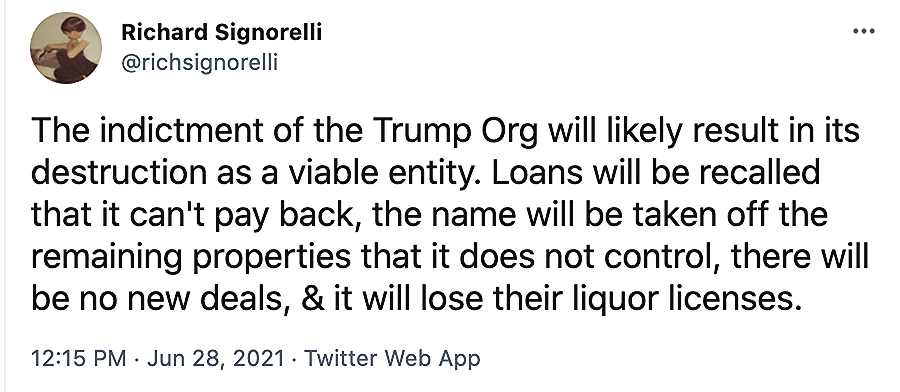

Hurts To Hurt Someone
This is probably a minority opinion, but speaking as one who’s been dropped cold or given the casual brush-off by several women during my hound-dog heyday (mid ’70s through late ’90s, not counting my four-year marriage from ’87 to ’91), it’s a bit more painful to dump than to get dumped.
I can think of eight or nine times when I suffered terrible heartache and deep-blue weeping fits after getting the heave-ho. Bottom of the well, my life is over, “I’ll never have that recipe again”, “Can’t live if livin’ is without you,” etc.
I can recall at least two times when I was so devastated by “love lost at such a cost” that I succumbed to something close to clinical depression. One time in late ’79 I was so bummed that I slept in my West 4th Street apartment for a whole week straight, getting up only for meals or to watch an occasional TV show.
I gradually learned after suffering through these breakups that you can’t negotiate or plead or beg your way out of them. When you’ve been dumped by a woman of character or conviction, the game is over. Nothing you can say or do will change her mind.
The best you can hope for is to persuade her to agree to continue having sex while you both hunt around for the next romantic opportunity. But even that rarely happens because by the time she’s told you she wants to fly solo or see other people she’s probably already found a replacement.
In the spring of ’79 I was seeing a West Village woman on an off-and-on basis. He or she who loves less always controls the relationship, so I guess I was the controller as my feelings for her were on the casual, come what may, comme ci comme ca side. Her feelings for me were more ardent, or so it seemed.
Then I met someone else who has prettier, hotter, sharper, classier — definitely a better catch. When the new thing began to happen I knew I had to tell the off-and-on lady. I wouldn’t dare try to two-time anyone. I wanted to play my cards honest and clean. No messing around.
Except when I visited the West Village, off-and-on apartment and lowered the boom, I felt awful. She began to cry a little bit and lament her awful luck with men, and all I could do was stand there and say “I’m sorry.”
The difference between this and the terrible feeling of being dumped is that dumpees don’t feel guilty — all they have is the ache. But if you drop someone you feel guilty about having caused great emotional harm, or at the very least a bad bruise. You feel like a bad person.
The only other time I felt like this was when a woman I’d been seeing on a fairly serious basis became aware of a little side dalliance. When she discovered I’d been catting with an actress I met while performing in a community theatre play, I was devastated. The serious relationship woman began to quake with weeping, and all of a sudden I felt like a beast who needed to be whipped. I’m sorry so sorry sorry…I’ll never do this again…please, forgive me…so sorry.
Boiled down, hurting someone feels much worse than being hurt.

